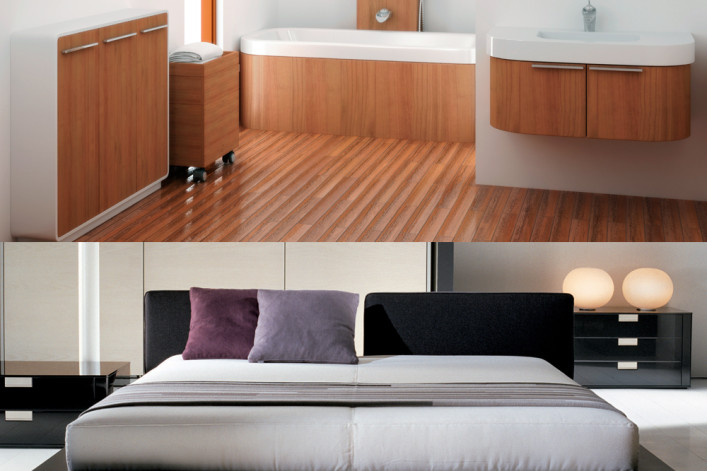10 renovation plans your board probably won't go for

Often the most difficult part of getting a renovation plan approved is not winning Department of Buildings approval or coming up with the extravagant amount of funds you will have to part with. No, the trickiest part is getting your plan approved by the board.
Enter Elliott Glass of Glass and Glass Architects. Hired by boards to review 30,000+ co-op and condo renovation plans over the course of his 50-year career, he has been described by the New York Times as “probably the most prominent reviewing architect in the city.”
He is also an incredible mine of information for aspiring renovators who prefer not to waste time and money dreaming the impossible dream.
So what's the riskiest business to attempt in your apartment?
In a recent conversation with Brick Underground, Glass explained that there are two categories of renovation plans that are the most problematic.
First, plans that would affect the building structurally or involve altering major systems (vertical piping, water lines, gas lines, ventilation ducts, etc) and, second, plans that may affect your neighbors, like a wet over dry situation or creating a layout that could cause sound leakage.
He says that the second issue is the trickiest of all because “sounds and noise issues are so subjective...and neighbors can find any reason for not liking each other."
In general, Glass says, boards these days are paying more attention than ever to all aspects of renovation plans.
“We see more elaborate renovation plans," he says. "People have more money to spend. Unlike tenants years ago who were happy with apartments the way they were, new tenants want to modernize"—making apartments more family-oriented, expanding kitchens into family rooms and adding all kinds of 21st century luxury features.
These days even some seemingly “minor” renovation plans, like removing a partition that is non-load-bearing between two rooms, may be subject to careful scrutiny by boards and by the architects/engineers they hire to help them rule on the plan.
To avoid a turndown the first time, don't rush, and do try and be creative, advises Michael Wolfe, a property manager with Midboro Management.
"First impressions matter," agrees Erika Belsey of Belsey and Mahla Architects. "If a plan is submitted and it doesn’t demonstrate an understanding of all the rules that a renovation must follow, from landmarks requirements, Department of Building codes, and co-op regulations to basic plumbing and structural feasibility, the building architect and the board will be very suspicious of the design team,"
Here are 10 renovation issues that will probably make your board sit up and take notice. Before you approach the board with any of them, be sure that they are (a) permissible, (b) possible and (c) worth the trouble.
1. Wet over dry
Often when people buy an apartment, particularly in one of the city’s coveted pre-war buildings, they want to make the kitchen bigger, add a new bathroom or expand an existing bathroom. Whenever that means that something wet (your shower or toilet or dishwasher) is going over something dry (your downstairs neighbor’s bedroom), you’ve got a potential problem.
“Water is the single most sensitive item when a board or building architects is considering renovation plans," says Belsey. "This can put you between a rock and a hard place because in order to meet code requirements, in particular ADA, a renovated maid’s bathroom must be made larger but the building wet over dry rules may prohibit it from being expanded. Usually the Board bows to the DOB and shows reasonable flexibility. But this doesn’t mean you can expand with impunity."
Some buildings flat out prohibit wet over dry. In others, it may be possible if the planning is done skillfully enough. For instance, says property manager Wolfe, if the plumbing is going above someone’s hallway, some boards may approve it because ”there are some good waterproofing systems out there these days.”
Tip: Proactively show that all the “wet” items (sinks, dishwashers, refrigerator) are still located in the original kitchen or bathroom footprint and the rest is just cabinetry, ie. “furniture” in the former dining room.
2. Stacking
Boards generally like things the way they are and always have been. They like living rooms over living rooms, bedrooms over bedrooms. You’re thinking of putting a playroom over your neighbor’s living room or a "media room" over their bedroom? That’s not going to make the board happy.
There are ways that engineers can mitigate the kinds of inherent noise issues these plans will raise, but Glass says that often boards don’t want to go down that road. He thinks that’s a wise decision—it just makes things more complicated the next time someone has a similar plan. Sometimes just say no is the best board option.
3. Electrical upgrades
It’s not unusual these days for owners to want to triple the electrical capacity of their apartments—huge air conditioners and kitchen appliances that are almost commercial grade all require much more power than what was needed when the building went up.
If the proposed work requires a three-phase system and the building is designed for single phase, an upgrade would require major work in the basement. Peter Varsalona of RAND Engineering & Architecture says that some boards, realizing that the demand for this kind of increase is growing, have upgraded some of the meter banks or distribution panels in their buildings, making the leap from single phase to triple phase possible.
An upgrade is more likely to be approved if the wiring involved can be run through the core of the building, says Nancy Evans of Walter B. Melvin Architects. Running lines outside the building, even in the back, is problematic “since it can interfere with facade maintenance."
4. Jacuzzis and steam units
If you’re thinking of turning your bathroom into a home spa, think again. According to Wolfe, in most buildings, these types of renovations are a no go. A therapeutic whirlpool might possibly get approved but Jacuzzis and steam units are considered too noisy, too likely to leak and the excess moisture of a steam unit requires specialized ventilation and may cause mold problems.
5. Sound systems
Most buildings don’t allow speakers on "demising" walls—the walls between apartments or an apartment and a common space. Some boards may let you install them in a dropped ceiling, as long as they don’t come into direct contact with the slab, a flat piece of stone or concrete used for floors and roofs.
6. Alterations to roofs
Evans says this is “always a fun one.” She means the opposite.
Glass says that renovations to the roof are particularly tricky because you’re dealing with an area that is already exposed. Translation: Penthouse owners who want to put in plants and watering systems are opening up a Pandora’s box of potential sources of damage.
7. Stone floors
More and more buyers want to create a “grand entrance”—which apparently involves replacing a wood floor with one made of stone in their entry hall. The problem: Footsteps are noisier on stone than wood.
Here’s where noise mitigation comes into play and you may need to get an acoustical engineer in your corner for back-up. There are materials that will in fact mitigate the noise of high heels on a stone floor--but does the board want to set a precedent?
8. Opening masonry/chopping into walls
Boards don’t like anything as drastic as chopping through interior or exterior walls. Evans explains that once you’ve penetrated a wall it’s hard for the next owner to infill it properly and to change or reverse the renovation.
Also, chopping into a demising wall risks interfering with fire separation materials. For exterior walls, renovations should never go deeper than the plaster and not affect the back up masonry because of the risk of water infiltration.
This can put a stop to some renovations that include up to the minute lighting schemes, wrap around sound or ventilation issues in your apartment. Some people want a professional strength stove but discover that it won’t be possible to vent it properly without making a cut in the wall--something that is most likely prohibited.
Finally, while some buildings prohibit air conditioning units that go through the wall, others will allow them at the back of the building only.
9. Washer-dryers and garbage disposals
Everyone wants a washer-dryer in their apartment. Varsalona says that he’s seen lots of plan reviews go back and forth between boards and shareholders on this issue.
“Residents push really hard on this one," he says.
In older buildings—prewar and many 50s, 60s, and 70s postwar ones—waste lines were just not sized to accommodate the kind of suds drainage that washing machines require, says Jon Colatrella of Howard L. Zimmerman Architects.
European-style high-efficiency washing machines, which use high-efficiency laundry detergent that produces significantly fewer suds, can help alleviate the problem. More modern buildings have suds pressure zones—a means of draining lower floor apartments separately from the ones on the upper floors—preventing upper floor suds from backing up into lower floor drains.
Where wet over dry is a concern—or even wet-over-wet water damage—approval is sometimes granted on condition that a leak-catching pan is installed under the washing machine along with a leak detection/automatic shutoff system.
With dryers, says Colatrella, the problem is with the ventilation. Although there are now ventless dryers on the market, they are not a great solution because they can create an overly humid condition in the apartment.
As for garbage disposals: Although the DOB allows them in New York apartments, most buildings do not. "
"No building that we represent allows disposals because of the wear and tear on the plumbing system," says Colatrella.
10. Site protection
You must be able to convince the board that your reno work will not negatively impact your neighbors. Boards have rules about when work is allowed and often how long a project can take. Boards charge substantial penalties for every day that a job goes beyond over its allotted time.
The site being renovated has to be “zipped up” with plastic so that the dust doesn’t penetrate anyone else’s living space. Sometimes, explains Mrakovcic, the hallway outside an apartment has to be used as a staging area. Your plans need to allow for ample passage for residents; building codes regulate the amount of clearance necessary. You'll probably need to put down a deposit to cover potential damage to common areas. To soften up a board, you might even want to offer to have your contractor perform some free cosmetic upgrades to your shared hallway.
Also keep in mind that while many buildings will allow you to temporarily shut down water, shutting down the gas to move a gas line is very rarely permitted.
Related posts:
NYC Renovation Chronicles: The 6 essential for board approval
Want to renovate? Here's how to get the money
NYC Renovation Questions: Can I move a gas line?
Here's why you may be overpaying for your renovation
A few things to consider before combining those apartments...
Ask an Expert: What's the best kitchen countertop material?
NYC renovation bloopers: 6 great ideas you'll regret having
How to put a washer/dryer in your NYC co-op (or condo)
Why is it so expensive to renovate in New York City? And what can I do about it?

























